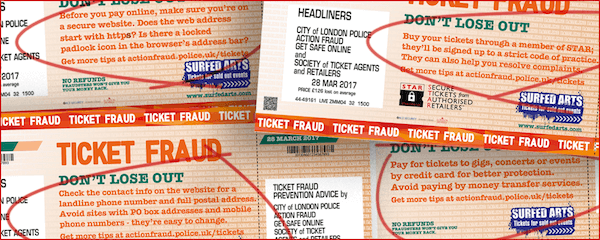We've been working with the City of London Police and in partnership with Get Safe Online and the Society of Ticket Agents and Retailers (STAR) to show just how easy it is to be tricked into buying fake tickets online.

We made Surfed Arts, a 'scam' ticket sales site.
— Action Fraud (@actionfrauduk) April 3, 2017
People thought it was real and were ready to hand over their money!https://t.co/V7h9XkxDhU pic.twitter.com/h7gKuFUibw
- More than 1,500 people tried to buy tickets from a fake ticket sales website set up to raise awareness of ticket fraud
- More than 21,000 people have reported falling victim to ticket fraud in the last 3 years
- More than £17 million has been reported to be lost to ticket fraudsters in the last 3 years
- Victims are most likely to be men in their twenties
We've been working with the City of London Police and in partnership with Get Safe Online and the Society of Ticket Agents and Retailers (STAR) to show just how easy it is to be tricked into buying fake tickets online.
How the 'sale' worked
During a series of Facebook flash advertising more than 1,500 people tried to purchase music tickets from 'Surfed Arts', out fake ticket sales website.
Surfed Arts is a website made to look a secondary ticket provider, imitating the way fraudsters offer fake tickets online. Our Facebook adverts targeted people living in areas where bands or artists are due to play sell-out concerts.
Adverts were shown to fans of Adele in London, Ed Sheeran in Manchester, Iron Maiden in Birmingham, Coldplay in Cardiff and Bruno Mars in Leeds.
Fans who clicked through were taken to the Surfed Arts website where they were immediately told that they were not able to buy tickets and advised on how to protect themselves from falling victim to real ticket fraudsters in the future.
Ticket fraud victims online
A recent report has shown that people are increasingly using other secondary tickets sources such as social media in order to purchase tickets. In the last three years more than 21,000 people have reported falling victim to ticket fraudsters and the majority of these reports concern the secondary ticket market and sources such as social media or independent ticket websites.
Last week 1,571 people thought our bogus ticket company was real https://t.co/V7h9XkxDhU
— Action Fraud (@actionfrauduk) April 3, 2017
The total lost to actual fraudsters is HUGE... pic.twitter.com/UE1ws9X81s
Recent legislation introduced will prevent the use of ‘bots’ buying tickets to re-sell at inflated prices, but the threat of bogus ticket outlets remains. Sites like Surfed Arts don’t have any tickets to sell in the first place; buyers pay for what looks like tickets to concerts, festivals or sporting events only for the seller to disappear with the victim’s money or send them counterfeited tickets that aren’t valid for entry.
The most common victim to report to Action Fraud is a man in his twenties. Bank transfers were the most commonly used method to buy tickets with 64.6 percent of people saying that it was the payment method used when they were defrauded. Of those reporting, more than 33% said that the fraud had a significant effect on their life and an additional 7.8% said that being defrauded in this way had severely affected them.
Protect yourself

